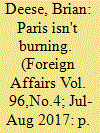| Srl | Item |
| 1 |
ID:
150784


|
|
|
|
|
| Summary/Abstract |
In June 2015, China announced its post-2020 reduction targets, its central element being the intention to peak CO2 emissions by 2030 or earlier. China has implemented several policies to reduce its greenhouse gas (GHG) emissions. This study provides emission projections for China up to 2030 given current policies and a selected set of enhanced policies, and compares the results with projected CO2 emission trajectories that are consistent with the announced target for 2030. The projections are based on existing scenarios and energy system and land use model calculations. We project that the 2030 CO2 emission level consistent with a peak in CO2 emissions by 2030 ranges from 11.3 to 11.8 GtCO2. The corresponding total GHG emission level ranges from 13.5 to 14.0 GtCO2e in 2030. Current policies are likely not to be sufficient to achieve the 2030 targets, as our projected total GHG emission level under current policies ranges from 14.7 to 15.4 GtCO2e by 2030. However, an illustrative set of enhancement policy measures, all of which are related to national priorities, leads to projected GHG emission levels from 13.1 to 13.7 GtCO2e by 2030 – and thus below the levels necessary for peaking CO2 emissions before 2030.
|
|
|
|
|
|
|
|
|
|
|
|
|
|
|
|
| 2 |
ID:
153335


|
|
|
| 3 |
ID:
190643


|
|
|
|
|
| Summary/Abstract |
At the United Nations Framework Convention on Climate Change 26th Conference of the Parties (COP 26) in November 2021, Vietnam pledged to phase out unabated coal power by the 2040s or as soon as possible thereafter. Achieving this will require major efforts. This study investigates the drivers for Vietnam's coal power phase-out decision, barriers to Vietnam achieving a successful unabated thermal coal phase out, and potential strategies to achieve the pledge. To this end, a survey of 43 experts from government agencies, research institutions, civil society, and industry was carried out, supplemented by 23 follow-up interviews. The results indicate that ambition to attract international support for green growth initiatives in a context of limited financing options for new coal power projects appears to have been the primary driver for the decision. Key barriers include concerns about electricity shortages and incomplete regulatory frameworks for new clean power options. Recommended strategies include: 1) reforming regulations to facilitate investments in clean energy, electricity transmission, and energy storage; 2) continuing political prioritisation; and 3) building broad-based support from the community and enterprises. Vietnam's case is relevant to other developing countries and beyond.
|
|
|
|
|
|
|
|
|
|
|
|
|
|
|
|